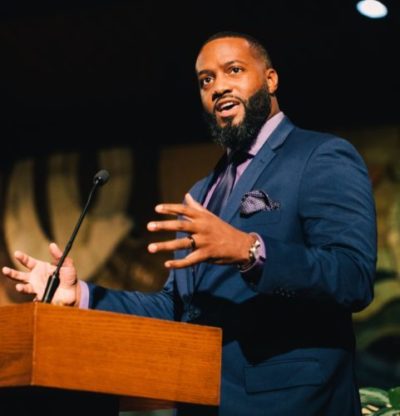Timothy Adkins-Jones, MDiv, PhD
Assistant Professor of Homiletics

Contact
3041 Broadway, BT 603
New York, NY 10027
[email protected]
EDUCATION
Ph.D., Boston University, Practical Theology (Homiletics)
M.Div., Boston University
B.A., Amherst College, Psychology
BioGRAPHY
Rev. Timothy Levi Adkins-Jones is the Pastor of the historic Bethany Baptist Church in Newark, New Jersey. A son of the church, Rev. Adkins-Jones was led to faith in Christ at the early by his grandfather the Rev. Leroy Jones at Pilgrim Journey Baptist Church in his hometown of Richmond, Virginia. Before being called to Bethany, Rev. Adkins-Jones faithfully led congregations in Massachusetts and Connecticut, building a young legacy of community activism and Christian service. He gladly serves as part of the leadership team for the New Jersey Black Multi-Faith Alliance and the Clergy Caucus for Faith in New Jersey, a non-partisan, multi-faith organization seeking social and economic change through policy and relationships.
Embodying the best of the Black preacher-scholar tradition, Rev. Adkins-Jones has a PhD in Practical Theology with a Homiletics concentration at Boston University. He also holds a BA in Psychology from Amherst College, and an MDiv from the Boston University School of Theology. A sought-out lecturer and speaker across the nation, Rev. Adkins-Jones previously taught courses in homiletics and polity at Yale Divinity School. He was featured on the “For Your Soul Sunday” Broadcast on SiriusXM UrbanView, and continues to serve his alma mater Amherst College as the Graduate Fellow for the Hermenia T. Gardner Christian Worship Series, a bi-semester worship celebration of the Black Church tradition.
Rev. Adkins-Jones is a member of Kappa Alpha Psi Fraternity, Inc. He is also the proud husband of Dr. Amey Victoria Adkins-Jones and the father of four loving and amusing souls, Sofia, Ezekiel, Isabella, and Judah Nwà who keep him young and busy.
RECENT/UPCOMING COURSES
SPRING 2022, SPRING 2021
This course provides a basic introduction to the theology, ethics, and practice of Christian preaching. Students explore the nature and purpose of preaching in relation to the interpretation of texts, culture, and community contexts. The course offers opportunities for students to hone the skills involved in effective sermon design and delivery.
FALL 2020
This course examines the ways that preaching has helped to galvanize and sustain social movements, shape the public discourse of pressing social issues, and serve as a practice of protest. The course attends to the history of the relationship between preaching and protest and the theologies undergirding its practice in various sociocultural contexts. Consideration is also given to the praxis of preaching during protests and rhetorical analysis of the speeches that emerge in protest moments. Students have the opportunity to craft sermons for protest and analyze them using the tools that are developed in this course.
FALL 2020
Though preaching is typically thought of as an encounter between a preacher and a congregation in space, circumstances often dictate a more distant form of proclamation. This course examines preaching practices that have been used for proclamation across distance. The necessity for virtual preaching in recent months has forced a proliferation of this practice, but distanced proclamation is a historic practice. This course covers some of the history and theology of distanced proclamation while providing opportunities for students to explore how key learnings may further shape their own distanced proclamation.
SPRING 2021
Who is the preacher and who does the preacher preach with? What difference would it make to think through a sermon with someone who is homeless? Or a victim of racial violence? Or in prison? Or someone of a different faith? Or a lay person or persons within the congregation? Or someone from another congregation? Or? Or? Or? Students learn about preaching methodologies that not only consider the congregation in sermon construction but those that include the congregation explicitly in the preaching process. We explore and utilize dialogical and collaborative forms of preaching and wrestle with their theological implications.
